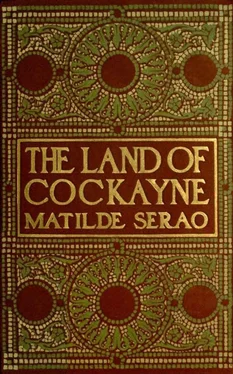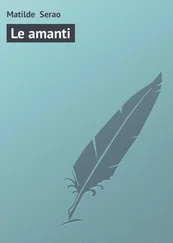Matilde Serao - The Land of Cockayne
Здесь есть возможность читать онлайн «Matilde Serao - The Land of Cockayne» — ознакомительный отрывок электронной книги совершенно бесплатно, а после прочтения отрывка купить полную версию. В некоторых случаях можно слушать аудио, скачать через торрент в формате fb2 и присутствует краткое содержание. Жанр: unrecognised, на английском языке. Описание произведения, (предисловие) а так же отзывы посетителей доступны на портале библиотеки ЛибКат.
- Название:The Land of Cockayne
- Автор:
- Жанр:
- Год:неизвестен
- ISBN:нет данных
- Рейтинг книги:3 / 5. Голосов: 1
-
Избранное:Добавить в избранное
- Отзывы:
-
Ваша оценка:
- 60
- 1
- 2
- 3
- 4
- 5
The Land of Cockayne: краткое содержание, описание и аннотация
Предлагаем к чтению аннотацию, описание, краткое содержание или предисловие (зависит от того, что написал сам автор книги «The Land of Cockayne»). Если вы не нашли необходимую информацию о книге — напишите в комментариях, мы постараемся отыскать её.
The Land of Cockayne — читать онлайн ознакомительный отрывок
Ниже представлен текст книги, разбитый по страницам. Система сохранения места последней прочитанной страницы, позволяет с удобством читать онлайн бесплатно книгу «The Land of Cockayne», без необходимости каждый раз заново искать на чём Вы остановились. Поставьте закладку, и сможете в любой момент перейти на страницу, на которой закончили чтение.
Интервал:
Закладка:
'Let us go and see them,' she said, going forward, followed by her husband. They crossed to the back part of the house, where were the servants' rooms, and came to the pantry. The wet-nurse from Fratta Maggiore, a fine, stout woman, with pink cheeks, great prominent eyes, and a calm, serene expression, wore her pale blue damask dress, trimmed with a broad yellow silk band, which went in such deep folds she seemed to swim at every step she took—it was stiff like a stuff building. She wore a white crape handkerchief, and a gold necklace of three rows of big hollow beads over it; the front of her dress was covered by a batiste apron, over which she spread her well-ringed hands. Her chestnut hair was tightly held back by a silver comb, from which fell a big bow of blue ribbon. Donna Candida, the midwife, was beside her, a guest who had to be asked; she had put on her red silk dress for big christenings, the portrait of her late husband, Don Nicodemo, in a brooch, and a red cotton camellia in her gray hair. Both she and the nurse, most important people, were waiting patiently, saying a few words to each other.
'I wish you all happiness,' called out the old nurse on seeing her patient.
'Thank you, Donna Candida. You have come early. Does waiting not bore you? Will you take something, nurse?' Luisella's voice showed tenderness for her little one's nurse.
'As your excellency pleases,' said the nurse, raising her soft, oil-coloured, rather stupid eyes.
Cesare went off, and brought a waiter with marsala and cakes for the women. The husband and wife stood looking at them quite touched, and when they stopped eating Luisella pushed the tray towards them. Donna Candida, who was a polite woman, held up her first glass of marsala, and called out:
'To Donna Agnesina's health!'
'To my little one's health!' said the other, laughing.
The husband and wife looked at each other with happy tears in their eyes, nodding their thanks. Suddenly the mother said:
'Nurse, the baby is crying.'
The nurse hurriedly dried her lips, put down the candy she was eating, and rushed off with a great rustle, opening her bodice as she went with an instinctive maternal movement.
But the guests were already coming into the reception-room, which was furnished with couches and easy-chairs in pomegranate brocade, their woodwork gilded; large carcels, placed on gray marble and gilt brackets, as well as big gilt-bronze lamps with crystal pendants cut in facets, lighted it up. Those who knew each other had joined in groups, and spoke to each other in a lively way under their voice, to look like people of spirit, society folk, and did not even look at the unknown guests; these had got into the corners by families, and brought easy-chairs and seats together to make a fortress for themselves, from whence they cast shy, inquisitive glances on the people and the furniture, suddenly dimmed by lowered eyelids if they felt themselves caught staring.
The family of Don Domenico Mayer (a clerk in the Finance Department) were like that. They lived in an apartment on the fifth floor in the Rossi Palace, a tall, deep building at Mercatello Square that looks on to four different streets, where the neighbours often do not know each other even by name, and can live for years without meeting, two large stairs besides two smaller ones make it such a puzzle. Don Domenico Mayer, with a misanthropic look and bureaucratic overcoat, led in a misanthropic family, composed of his wife, with flabby, colourless cheeks, always suffering from neuralgia; his daughter Amalia, a tall, stout girl, with prominent eyes, thick nose and lips, and heavy black tresses, who suffered from hysterical convulsions; and Alfonso, the son, called Fofò by everyone, who was troubled by a growing silliness and a huge appetite. The misanthropic family had formed into a square; the women pulled in their poor though tidy gowns round their chairs, and father and son sat at the edge of theirs stiff and silent. Like them, other families held themselves apart—clerks, little tradesmen, managers—with serious looks, keeping their elbows to their sides, passing their hands mechanically over their shiny, not to say glazed, beavers; whilst on the other side were all the Fragalàs, and with them the Naddeos, great ironware dealers at Rua Catalana; the Antonaccis, prosperous cloth merchants at the Mercanti; and the Durantes, great dealers in dry cod at Pietra del Pesce—the men in broad-cloth, the women in brocade or silk, with jewels, especially bracelets, like Luisella Fragalà. Her charming presence in the drawing-room was hailed by a general movement: all rose; the boldest or most intimate left their places and surrounded her, while the shy ones kept at a little distance, waiting composedly till they were seen and greeted.
All rejoiced with her on her restored health, calling her 'Mama, Mama,' wishing her in the Southern style this and a hundred others, all in good health—that is to say, a hundred more children, no less. She got pink with pleasure, bent her head in giving thanks, which made the diamond star in her hair sparkle: it was a subject for comment to the other Fragalàs, the Naddeos, the Antonaccis, and Durantes; it was the secret-sighing admiration of all the other humble guests, the so-called mezze signore. Then, while Cesare Fragalà chattered with the men, laughing, passing his gloved hand through his curly hair, there was a general return to the couches and easy-chairs: all sat down.
Luisella Fragalà, standing in the middle of the room, went to meet each lady that she saw coming in at the door, greeted her smilingly, and led her to an easy-chair, making a large feminine circle, where fans waved slowly over opulent bosoms encased in brocade. Only the middle couch remained empty—it was the post of honour; all were looking at it and towards the door, waiting the unknown guests who were to sit there: for they knew the party would not really begin without them, and no refreshments would be offered till the guests of high rank appeared; in fact, Luisella and Cesare as the time passed gave each other inquiring glances. Suddenly, as a couple came into the room, Luisella made a quick, joyful gesture, effusively embraced the lady, and pressed the gentleman's hand smilingly; a whisper went through the room, someone got up, a name was breathed. It was really him, Don Gennaro Parascandolo, the famous Don Gennaro, a tall, strong, agreeable man, with a countenance breathing honesty, good faith, good temper; his hand-shake was hearty, his smile cheered the most low-spirited people, his glance put life into one; a very rich man—in short, little Agnesina's godfather, a rich man with no children.
He had had children—he and his sickly wife with the grayish hair and sad eyes. She liked to stay shut up in her sumptuous silent house, and when she went about with him looked like a woman's shadow, a living image of grief. They had had three lovely children, two boys and a girl, healthy and strong, for whom Don Gennaro Parascandolo had worked at his cold terrible trade of aristocratic usurer to make them rich. He never lent less than five thousand francs or more than two hundred thousand at one time, always at 10 per cent. a month—cruel for his children's sake. But diphtheria had come into his house, furtively, irremediably; in twenty-five days the most distinguished doctors' science, father and mother's despair, money poured out, were found useless: nothing could save the three children. All died choking in such a painful way that Signora Parascandolo's reason seemed to give way for a time. Even the strong man seemed to reel for a moment; he only recovered very slowly. He travelled a great deal, he showed at all first nights, gave flowers and jewels to famous dancers—all with the greatest indifference, not as if he was bored, but with no brightness nor gaiety. Now and then, very seldom, his wife went out with him, a colourless taciturn creature, incapable of distracting her thoughts even for a moment from her three dead children; but at these times Don Gennaro got gay: he came out with a heavy commercial wit to which his wife responded with a slight distracted smile.
Читать дальшеИнтервал:
Закладка:
Похожие книги на «The Land of Cockayne»
Представляем Вашему вниманию похожие книги на «The Land of Cockayne» списком для выбора. Мы отобрали схожую по названию и смыслу литературу в надежде предоставить читателям больше вариантов отыскать новые, интересные, ещё непрочитанные произведения.
Обсуждение, отзывы о книге «The Land of Cockayne» и просто собственные мнения читателей. Оставьте ваши комментарии, напишите, что Вы думаете о произведении, его смысле или главных героях. Укажите что конкретно понравилось, а что нет, и почему Вы так считаете.












